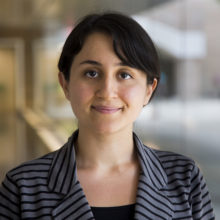Postdoctoral Research Fellow, University of Michigan
Email
Abstract
Network games with applications in cyber security
The outcomes of many social and economic interactions are affected by an underlying network of connections among their users. For instance, networks play a central role in the provision of public goods (e.g. cyber security), where they determine the externalities and spill-overs among agents, and consequently, the aggregate level of public good provided through the agents’ private contributions.
In this work, we characterize the role of the underlying graph structure in determining outcomes of strategic interactions over networks. First, at the network level, we identify a necessary and sufficient condition for the uniqueness of the Nash equilibrium in network games with linear best-replies. We show how this result unifies, and extends, previous results in the literature. We further identify sufficient conditions for the uniqueness of the Nash equilibrium, as well as its stability, in games with non-linear best-replies. We find that both the uniqueness and stability of equilibria are related to the lowest eigenvalue of suitably defined matrices, determined by the network’s adjacency matrix, as well as the slopes of the interaction functions.
Next, at the node level, we show that each agent’s effort in games of linear best-replies can be determined by her position in the network, and specifically, by her centrality in the interaction graph. We illustrate how this finding can provide guidelines for targeted interventions that improve a network’s state of cyber security.
Bio
Parinaz Naghizadeh is a postdoctoral research fellow in EECS at the University of Michigan. Her research interests are in network economics, game theory, cyber security, optimization, and data analytics. She received her Ph.D. in electrical engineering from the University of Michigan in 2016, M.Sc. degrees in electrical engineering and mathematics, both from the University of Michigan, in 2013 and 2014, respectively, and her B.Sc. in electrical engineering from Sharif University of Technology, Iran, in 2010. She was a recipient of the Barbour scholarship in the 2014-15 academic year.
